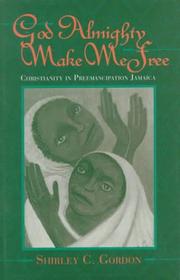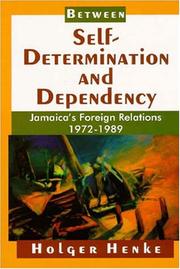| Listing 1 - 10 of 41 | << page >> |
Sort by
|
Book
ISBN: 9068323288 Year: 1993 Volume: *9 Publisher: Amsterdam Koninklijk Instituut voor de Tropen
Abstract | Keywords | Export | Availability | Bookmark
 Loading...
Loading...Choose an application
- Reference Manager
- EndNote
- RefWorks (Direct export to RefWorks)
Regional documentation --- Jamaica --- Jamaica ; reisgidsen --- #A9310A --- Jamaïca --- land- en volkenkunde --- 917.29 --- reisgidsen --- Caraïbische eilanden, Cuba --- Jamaica. --- Jamaïque --- G'amaiḳah --- Xaymaca --- Jamaika (Country) --- Ямайкэ --- I︠A︡maĭkė --- جامايكا --- Jāmāyikā --- Chamaica --- J·amayica --- Xamaica --- Xamayka --- Yamayka --- Ямайка --- I︠A︡maĭka --- Yamaika --- Jamajka --- Джамайка --- Dzhamaĭka --- Tschameeki --- Jaméíkʼa --- Τζαμάικα --- Tzamaika --- ジャマイカ --- West Indies (Federation)
Book
ISBN: 3961101140 3961101159 9783961101146 9783961101153 Year: 2018 Publisher: Berlin Language Science Press
Abstract | Keywords | Export | Availability | Bookmark
 Loading...
Loading...Choose an application
- Reference Manager
- EndNote
- RefWorks (Direct export to RefWorks)
An ability to speak Jamaican Standard English is the stated requirement for any managerial or frontline position in corporate Jamaica. This research looks at the phonological variation that occurs in the formal speech of this type of employee, and focuses on the specific cohort chosen to represent Jamaica in interactions with local and international clients. The variation that does emerge, shows both the presence of some features traditionally characterized as Creole and a clear avoidance of other features found in basilectal and mesolectal Jamaican. Some phonological items are prerequisites for “good English” - variables that define the user as someone who speaks English - even if other Creole variants are present. The ideologies of language and language use that Jamaican speakers hold about “good English” clearly reflect the centuries-old coexistence of English and Creole, and suggest local norms must be our starting point for discussing the acrolect.
Linguistics --- English language --- Phonology --- Jamaica --- Social aspects. --- Jamaïque --- G'amaiḳah --- Xaymaca --- Jamaika (Country) --- Ямайкэ --- I︠A︡maĭkė --- جامايكا --- Jāmāyikā --- Chamaica --- J·amayica --- Xamaica --- Xamayka --- Yamayka --- Ямайка --- I︠A︡maĭka --- Yamaika --- Jamajka --- Джамайка --- Dzhamaĭka --- Tschameeki --- Jaméíkʼa --- Τζαμάικα --- Tzamaika --- ジャマイカ --- West Indies (Federation) --- Germanic languages
Book
ISBN: 082135826X 0821358278 9786610085163 1280085169 Year: 2004 Publisher: Washington, DC : World Bank,
Abstract | Keywords | Export | Availability | Bookmark
 Loading...
Loading...Choose an application
- Reference Manager
- EndNote
- RefWorks (Direct export to RefWorks)
Third World: economic development problems --- Jamaica --- Economic conditions. --- Economic policy. --- Jamaïque --- G'amaiḳah --- Xaymaca --- Jamaika (Country) --- Ямайкэ --- I︠A︡maĭkė --- جامايكا --- Jāmāyikā --- Chamaica --- J·amayica --- Xamaica --- Xamayka --- Yamayka --- Ямайка --- I︠A︡maĭka --- Yamaika --- Jamajka --- Джамайка --- Dzhamaĭka --- Tschameeki --- Jaméíkʼa --- Τζαμάικα --- Tzamaika --- ジャマイカ --- West Indies (Federation)

ISBN: 0585104964 9780585104966 0253330521 0253210658 9780253330529 9780253210654 Year: 1996 Publisher: Bloomington Indiana University Press
Abstract | Keywords | Export | Availability | Bookmark
 Loading...
Loading...Choose an application
- Reference Manager
- EndNote
- RefWorks (Direct export to RefWorks)
This important text describes the impact of evangelical Christianity on slaves in Jamaica (the overwhelming majority of the island's population) in the eighty-four years between the arrival of the first European Protestant missionaries and the emancipation of British slaves in 1838. Shirley C. Gordon argues that the conversion process was achieved through the work of black and colored proselytizers - independent preachers and deacons, leaders, aids, slave and free - and European missionary stations. The acceptance of Christianity was progressively associated with slaves' growing aspirations for freedom, and the desire of freed persons for socio-political recognition in colonial society. Gordon draws on letters and diaries of European missionaries who reported their encounters with a largely illiterate population. These accounts reflect the varied responses to missionaries, and the consistent opposition from the slave-holding sugar interests in Jamaica. This volume also dramatizes the counterpoint between missionary preaching for conversion and the slave beliefs and practices originating in African traditions. God Almighty Make Me Free represents Caribbean-centered history using missionary sources to explore the responses of a slave and free population to the Christian teaching of white European and of black American and native preachers. This work provides a unique analysis of black American religion under slavery.
Blacks --- Religion --- Philosophy & Religion --- Christianity --- Negroes --- Ethnology --- Religion. --- Jamaica --- Jamaïque --- G'amaiḳah --- Xaymaca --- Jamaika (Country) --- Ямайкэ --- I︠A︡maĭkė --- جامايكا --- Jāmāyikā --- Chamaica --- J·amayica --- Xamaica --- Xamayka --- Yamayka --- Ямайка --- I︠A︡maĭka --- Yamaika --- Jamajka --- Джамайка --- Dzhamaĭka --- Tschameeki --- Jaméíkʼa --- Τζαμάικα --- Tzamaika --- ジャマイカ --- West Indies (Federation) --- Church history --- Black persons --- Black people
Book
ISBN: 1435694864 9781435694866 Year: 1998 Publisher: Barbados Kingston, Jamaica Press, University of the West Indies
Abstract | Keywords | Export | Availability | Bookmark
 Loading...
Loading...Choose an application
- Reference Manager
- EndNote
- RefWorks (Direct export to RefWorks)
Jamaica --- Church history. --- Religion --- African influences. --- Jamaïque --- G'amaiḳah --- Xaymaca --- Jamaika (Country) --- Ямайкэ --- I︠A︡maĭkė --- جامايكا --- Jāmāyikā --- Chamaica --- J·amayica --- Xamaica --- Xamayka --- Yamayka --- Ямайка --- I︠A︡maĭka --- Yamaika --- Jamajka --- Джамайка --- Dzhamaĭka --- Tschameeki --- Jaméíkʼa --- Τζαμάικα --- Tzamaika --- ジャマイカ --- West Indies (Federation)

ISBN: 1435694708 9781435694705 976640058X Year: 2000 Publisher: Barbados University of the West Indies Press
Abstract | Keywords | Export | Availability | Bookmark
 Loading...
Loading...Choose an application
- Reference Manager
- EndNote
- RefWorks (Direct export to RefWorks)
Jamaica --- Foreign relations. --- Foreign economic relations. --- Politics and government --- Jamaïque --- G'amaiḳah --- Xaymaca --- Jamaika (Country) --- Ямайкэ --- I︠A︡maĭkė --- جامايكا --- Jāmāyikā --- Chamaica --- J·amayica --- Xamaica --- Xamayka --- Yamayka --- Ямайка --- I︠A︡maĭka --- Yamaika --- Jamajka --- Джамайка --- Dzhamaĭka --- Tschameeki --- Jaméíkʼa --- Τζαμάικα --- Tzamaika --- ジャマイカ --- West Indies (Federation)
Book
ISBN: 1909930113 1909930121 9781909930117 1306936462 9781306936460 9781909930124 9781908493972 1908493976 Year: 2014 Publisher: Oxford
Abstract | Keywords | Export | Availability | Bookmark
 Loading...
Loading...Choose an application
- Reference Manager
- EndNote
- RefWorks (Direct export to RefWorks)
Bennett, Louise, --- Bennett-Coverly, Louise Simone, --- Coverly, Louise Simone Bennett-, --- Lou, --- Miss Lou, --- Jamaica --- Jamaïque --- G'amaiḳah --- Xaymaca --- Jamaika (Country) --- Ямайкэ --- I︠A︡maĭkė --- جامايكا --- Jāmāyikā --- Chamaica --- J·amayica --- Xamaica --- Xamayka --- Yamayka --- Ямайка --- I︠A︡maĭka --- Yamaika --- Jamajka --- Джамайка --- Dzhamaĭka --- Tschameeki --- Jaméíkʼa --- Τζαμάικα --- Tzamaika --- ジャマイカ --- West Indies (Federation) --- Social life and customs.
Book
ISBN: 0739170503 9780739170502 1306170923 9781306170925 9780739170496 073917049X Year: 2013 Publisher: Lanham
Abstract | Keywords | Export | Availability | Bookmark
 Loading...
Loading...Choose an application
- Reference Manager
- EndNote
- RefWorks (Direct export to RefWorks)
Colonial Capital Theory at Work is a contribution to the emerging Caribbean and an explanation of how "sociological imagination," or the links between history and biography, have been intentionally used by some to achieve prosperity.
Jamaica --- United States --- Great Britain --- Jamaïque --- G'amaiḳah --- Xaymaca --- Jamaika (Country) --- Ямайкэ --- I︠A︡maĭkė --- جامايكا --- Jāmāyikā --- Chamaica --- J·amayica --- Xamaica --- Xamayka --- Yamayka --- Ямайка --- I︠A︡maĭka --- Yamaika --- Jamajka --- Джамайка --- Dzhamaĭka --- Tschameeki --- Jaméíkʼa --- Τζαμάικα --- Tzamaika --- ジャマイカ --- West Indies (Federation) --- Emigration and immigration. --- Immigration
Book
ISBN: 0813938325 9780813938325 9780813933894 0813933897 9780813933887 0813933889 9780813933917 0813933919 9780813938318 0813938317 1299265839 Year: 2016 Publisher: Charlottesville University of Virginia Press
Abstract | Keywords | Export | Availability | Bookmark
 Loading...
Loading...Choose an application
- Reference Manager
- EndNote
- RefWorks (Direct export to RefWorks)
By the mid-eighteenth century, observers of the emerging overseas British Empire thought that Jamaica--in addition to being the largest British colony in the West Indies--was the most valuable of the American colonies. Based on a unique set of historical lists and maps, along with a variety of other contemporary materials, Jack Greene's study provides unparalleled detail about the character of Jamaica's settler society during the decade of the 1750s, as the first century of British settlement drew to a close. Greene's sources facilitate a close examination of many aspects of the island's development at a particularly critical point in its history. Analysis of the data generated from this material permits a fine-grained account of patterns of landholding, economic activity, land use, social organization, and wealth distribution among Jamaica's free population during a period of sustained demographic, economic, social, and cultural expansion. Calling attention to local variations, the study puts special emphasis on the complexity and vitality of Jamaica's settler population, the island's economic and social diversity, the ubiquity and adaptability of slavery, the character and size of settler households, the range of urban professions, the value of urban housing, and the gender and racial dimensions of wealth holding. Greene's detailed analyses amplify and enrich these subjects, offering the most refined portrait to date of Jamaican society at a crucial juncture in its formation and providing scholars a quantitative base for analyzing Jamaica's political economy in the second half of the eighteenth century.--Publisher website.
Jamaica --- Jamaïque --- G'amaiḳah --- Xaymaca --- Jamaika (Country) --- Ямайкэ --- I︠A︡maĭkė --- جامايكا --- Jāmāyikā --- Chamaica --- J·amayica --- Xamaica --- Xamayka --- Yamayka --- Ямайка --- I︠A︡maĭka --- Yamaika --- Jamajka --- Джамайка --- Dzhamaĭka --- Tschameeki --- Jaméíkʼa --- Τζαμάικα --- Tzamaika --- ジャマイカ --- West Indies (Federation) --- Social conditions --- Economic conditions --- History --- Great Britain --- United States --- Colonies --- Administration.
Book
ISBN: 1316529991 1107623421 Year: 2013 Publisher: Cambridge : Cambridge University Press,
Abstract | Keywords | Export | Availability | Bookmark
 Loading...
Loading...Choose an application
- Reference Manager
- EndNote
- RefWorks (Direct export to RefWorks)
Originally published in 1957, and sponsored by the Conservation Foundation, this book assesses the impact of population growth on the island of Jamaica. Roberts does not confine himself only to statistics, but also considers the ways in which changes in population affect social structures, employment trends and land use. This book will be of value to anyone with an interest in human ecology or conservation.
Jamaica --- Jamaïque --- G'amaiḳah --- Xaymaca --- Jamaika (Country) --- Ямайкэ --- I︠A︡maĭkė --- جامايكا --- Jāmāyikā --- Chamaica --- J·amayica --- Xamaica --- Xamayka --- Yamayka --- Ямайка --- I︠A︡maĭka --- Yamaika --- Jamajka --- Джамайка --- Dzhamaĭka --- Tschameeki --- Jaméíkʼa --- Τζαμάικα --- Tzamaika --- ジャマイカ --- West Indies (Federation) --- Population.
| Listing 1 - 10 of 41 | << page >> |
Sort by
|

 Search
Search Feedback
Feedback About UniCat
About UniCat  Help
Help News
News